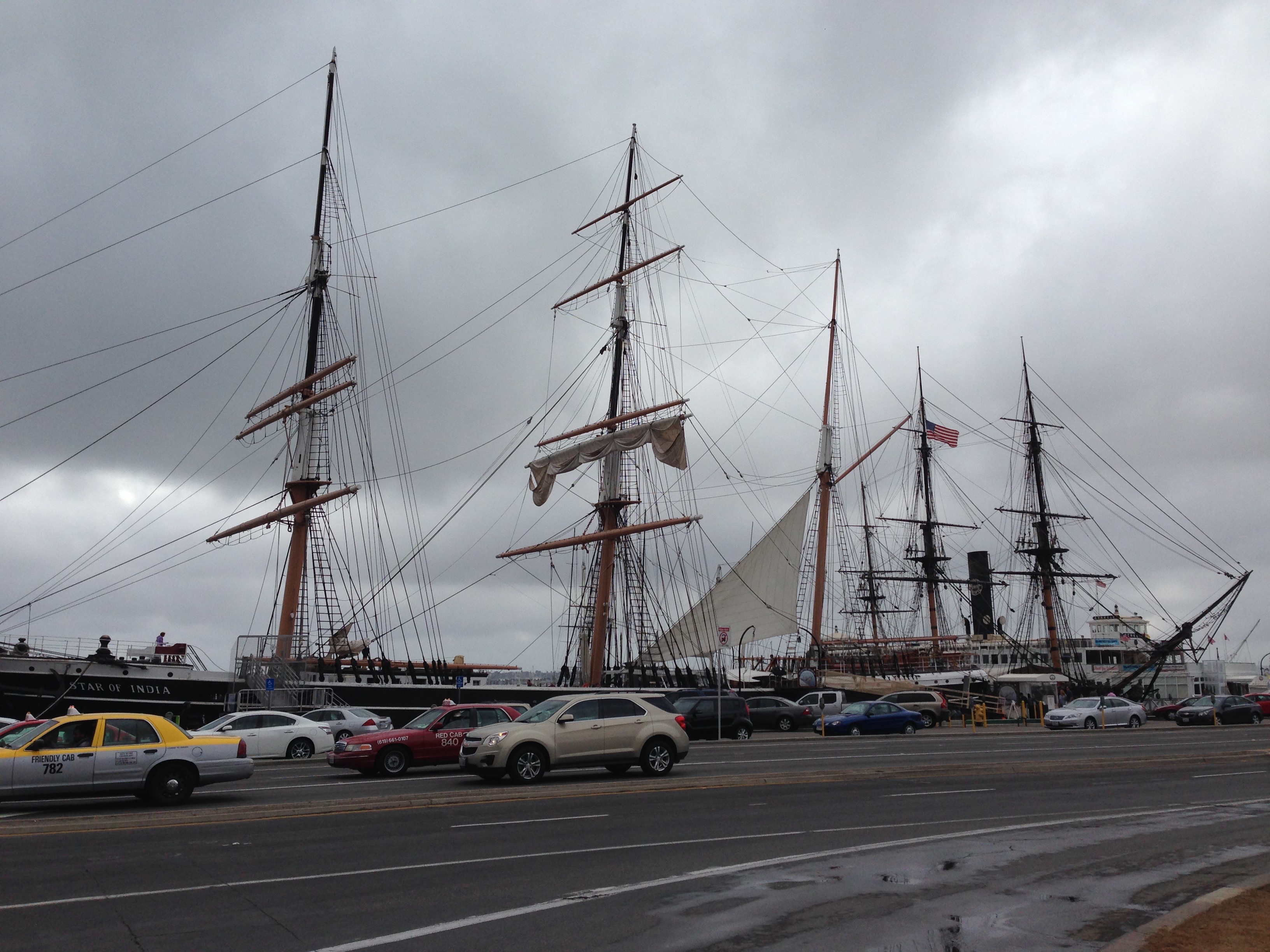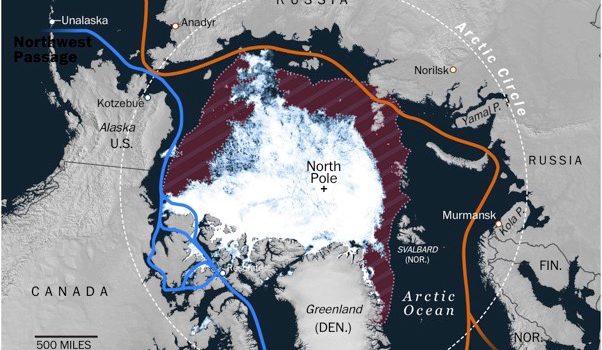Program Summary
“Crisis in the Arctic: Man vs. Nature, Man vs. Man”
A Presentation and Discussion on 16 January 2019 with
Joseph L. Shaefer
USAF BGen (ret) and NSF Regular
On an aptly cold and snowy wintry day in January NSF’s own Joseph Shaefer (BGen (ret), USAF) shared his insight and national security wisdom gathered from many decades of deployments and studies of the Arctic. We are grateful that Joe, his lovely wife Heather, and many intrepid NSF participants braved Reno’s own Arctic blast to come learn about the challenges facing our military and policy-makers as they meet new players and old adversaries in the rapidly changing geopolitical boundaries of the Arctic.
Joe’s presentation opened with a sanguine discussion about why the Arctic matters to life on earth. Serving as the earth’s air conditioner, the Artic receives warm air currents from the equator as they move northward, cools them in one of the nature’s great “heat sinks,” and sends the cooler air back down to the tropics to keep the planet livable in nearly all latitudes. Covered predominantly in ice, the “whiteness” of the Arctic (i.e., albedo) also reflects most solar radiation keeping the region cold enough to chill both warm air and warm water currents.
Humans, however, often, create the economic impetus and desire to adjust nature to meet our goals of economic and geographic expansion — even in the hostile environs of the Arctic. Motivated for centuries by the search for a shorter route from Europe to Asia, many countries have pioneered progressively more technologically advanced means to break through the northern ice to reach the other side. Russia succeeded. It now has several fleets of icebreakers deployed in the region, the newest of which can cut through 9ft of ice to open up new trade routes and access new natural resources. Nearly 36% of the earth’s fossil fuels are estimated to be “locked below” Arctic ice. Countries such as Russia are also exploring ways to use their large landmass under Arctic permafrost as new agriculture lands to feed a growing global population.
Following the axiom that the Arctic is the world’s “ultimate high ground,” countries that control the Arctic may ultimately have a significant impact on the balance of power worldwide. The Russians consider the Arctic their link to global power and dominance, but they are not the only ones vying for power in the north. The Arctic Council is comprised of Russia, the U.S., Canada, Denmark (through Greenland), Iceland (through their economic zone which extends out 212 miles into the Arctic) and finally Sweden and Finland, which have no ocean access to the Arctic, but who do have landmasses above the Arctic Circle.
Russia believes they deserve a larger voice in Arctic decisions than the others because they have the longest coastline and the most “residents” in the region. Russia is also hastening claims on territorial waters (12 miles from the coast) by expanding their reach. Local Russian industries are effectively warming surrounding areas making more land available, and hence, more territorial waters within their control. And what is the U.S. doing in response to Russia’s power play in the north? Joe firmly stated that the U.S. is abdicating leadership in this critical area as we took both eyes and resources elsewhere starting after the collapse of the Soviet Union in 1991. Leadership and resolve went missing in U.S. policy-making with regards to Russia post 1992, leaving open the door for Russia to steadily build more military and industrial infrastructure and influence in the Arctic. Many of their actions remain today unchecked by the U.S. or others.
So, who wins as the northern sea route between East Asia and Western Europe becomes more accessible? Russia, being the “toll taker” with the most territorial waters, stands to gain significantly as more ships from many countries chose northern routes to realize savings of 10-15 days at sea per ocean-going vessel. Russia also gets to use their own waters to move more oil, gas and other goods to growing markets in Asia. China, not wanting to be left out of the game, is now financing Russian infrastructure to expand their reach on natural resources and cost-saving trade routes, including a $27 billion liquified natural gas (LNG) plant at Yamal. Currently, 30% of Russia’s GDP comes from the Arctic region and they want this to increase significantly.
“Russia is the world’s gas station.”
Russia’s ultimate objective is to control all access to the northern sea routes by ensuring that only their icebreakers are able to pilot commercial ships and only their ships carry fuel. Their control stems from the fact that, at present, the only ice-free routes pass through Russian territorial waters. Is anything stopping their expansion in the Arctic? Living in the harsh climes of the Arctic requires not just all-weather infrastructure and workers, it also requires a civil society that makes life livable for those who chose (or are chosen) to keep the lights on and fuel flowing. Russia may have the technologies, but it is short on livable communities north of the Arctic Circle.

Who loses as Russia pushes for more and more open passages in the north? The biggest impact will likely come to countries dependent on maintaining trade routes through the Suez Canal (i.e., Egypt) and ports of call alone the existing routes, i.e., Mediterranean ports, the Azores, and Canary Islands. But those impacts pale in comparison to the adverse impacts already occurring to the fragile ecosystems, wildlife, Native communities, and aquatic species that depend on the preserving the Arctic climate and environment. And the rest of the planet relies on nature’s Arctic air conditioner to keep the planet livable.
Is the U.S. and other countries taking this issue seriously? You do the math…Russia has more icebreakers (46) than all other countries combined. The U.S. has 5 (sort of) 3 of which are functional. China is also pushing hard to be in the game, releasing a whitepaper recently that described China as a “near Arctic State.” Geographically this almost laughable claim would put Mexico and Ukraine in the same category as China, but it is no laughing matter for Chinese leaders. The Polar Silk Road (as they call the northern passage) is a key part of their global economic expansion.
“This page intentionally left blank.”
This quote was Joe’s quip about the current state of the United States’ Arctic policy. That said, Russia’s bellicose approach to the region is starting to be heard even at 40o north (i.e., Washington, DC). Luckily, our NATO partners in the Arctic Council are advocating for a some good old “cold war” pushback to Russia. It is time the United States returns the favor with leadership and resolve to both preserve this critical ecological region of our planet and to maintain a sustainable balance of power, globally.
Joe graciously fielded a range of questions about Arctic geopolitics starting with an inquiry about how the U.S. standing on the Arctic Council is impacted by the U.S. not ratifying the United Nations Convention on the Law of the Sea (UNCLOS, signed in 1982 and modified in 1994). UNCLOS established territorial waters at 12 miles and economic zones at an additional 200 miles from a country’s coast. UNCLOS came into force in 1994 (even without U.S. ratification) and as such the U.S. recognizes it as international law and uses this to push issues within the Arctic Council.
In discussing the current climate in the Arctic with the reminder that in the not so distant past the Vikings settled Greenland in a warmer Arctic, Joe recommended an excellent book on climatic change on a geological timescale. “The Whole Story of Climate: What Science Reveals about the Nature of Endless Change”by geologist E. Kirsten Peters. For all those who asked, yes it is available on Amazon! The key lesson from that book is that the earth’s climate is always changing. If you don’t like the climate just wait 5000 years...
Returning to the topic of U.S. leadership in the Arctic, Joe reminded us that the U.S. Coast Guard has 3 working icebreakers and Russia has 46! We are only just barely in the game right now. If we want to demonstrate leadership and resolve, Joe believes one option is to create an Arctic Command within the U.S. military to demonstrate that we have eyes and resources committed there. We need to show we are willing to train troops and expend resources if we expect Russia to take us seriously and respond to our pushback without military confrontation. Joe also strongly advocates for multilateral negotiations through the Arctic Council to keep the pressure on Russia to stay within its boundaries both territorially and geopolitically.
As for the new-found friendship between China and Russia in the north, Joe commented that China has money and needs natural resources (especially fossil fuels) and Russia is the world’s gas station and needs big customers. That means China is willing to fund infrastructure in the Arctic for as long as Russia pays its bills and keeps the gas flowing. Once either of those stop…Russia may find its relationship with China turns even chillier than a December night in the far north. China also likes using its sway with Russia in the Arctic to poke at the United States in other areas including the South China Sea.
In closing, Joe shared his insight on how best to learn and stay informed about the Arctic. He advocates exploring the region by sea, land, or air to learn about its beauty and majesty first-hand. Given today’s news cycle, it is unlikely that Arctic news will land on the front page of most newspapers, so we need to be persistent. Google Arctic news regularly. It may not make to your news alerts, but the national security implications of Arctic actions are vitally important and worth the search!
Joseph Shaefer (BGEN (ret), USAF) is a NSF regular contributor and member of the Program Committee. He serves on the Board of Advisors of strategic consulting firm Omnis, Inc. of McLean, VA as a senior consultant on national security, terrorist finance, counter-insurgency and world affairs. Joe’s military career spanned 36 years, Army and Air Force, Active, Guard and Reserve, from Private to Brigadier General. His assignments included: Special Forces A-Team commander, NATO and Southeast Asia country officer at the Defense Intelligence Agency (DIA,) Mobile Interrogation Team commander in the First Gulf War, air attaché to Myanmar (Burma,) senior political/military affairs officer for the Air Force Deputy Chief of Staff, and chief of the reserve intelligence forces for the US Strategic Command, DIA, and Air Combat Command. Joe’s undergraduate degree from UCLA is in International Relations and his Masters from American Public University is in Military Studies). In his civilian career, Joe was Senior VP in charge of Service and Business Development and later the Fixed Income Division at Charles Schwab & Co. At present, Joe is Chief Executive Officer of investment advisor Stanford Wealth Management. Joe has served at the Central Intelligence Agency on a special panel to counter terrorist finance and has been published or reviewed in the Wall Street Journal, Strategic Review, American Thinker, Forbes and many other publications.


